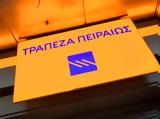Piraeus Bank Faces Investor Scrutiny Over National Insurance Acquisition from CVC
Piraeus Bank is set to face tough questions from analysts and investors in London on Monday over its recent acquisition of a 90% stake in National Insurance from private equity firm CVC.
The
The acquisition, which comes at a cost of €540 million, values 100% of National Insurance at €600 million—€70 million less than the original binding offer. Market reactions have been cautious, with analysts expressing skepticism about the financial and strategic benefits of the transaction. Many question whether the deal will create value for Piraeus Bank’s shareholders, given the impact it will have on the bank’s financial position.
The acquisition is expected to weigh on Piraeus Bank’s Common Equity Tier 1 (CET1) capital ratio, reducing it by around 150 basis points. This raises concerns about the bank’s capital adequacy and overall financial risk. Moreover, the expected earnings boost from the transaction is relatively modest, with profits per share projected to increase by only 5%. The anticipated annual profit contribution from National Insurance is estimated at €60 million, compared to the insurer’s adjusted pre-tax earnings of €100 million in 2023.
The price Piraeus Bank is paying—roughly 1.35 times National Insurance’s book value—has added to investor concerns. Many are questioning whether the bank is overpaying and whether the expected return on investment justifies the acquisition. Some have also raised broader strategic questions about why Piraeus Bank is paying a premium for an asset that was previously owned by Greece’s National Bank before CVC took control.
Operationally, the integration of National Insurance is expected to present challenges. The insurer continues to deal with legacy issues, including old health insurance contracts and longstanding bancassurance agreements with National Bank of Greece.
These factors could complicate efforts to streamline operations and fully integrate the company into Piraeus Bank’s existing financial ecosystem.
Further complicating the outlook is the structure of National Insurance’s business. Around 80% of its revenues come from its independent sales network, with only a small percentage generated through bancassurance. This limits Piraeus Bank’s ability to immediately leverage its own banking network to drive additional revenue from the acquisition.
Additionally, Piraeus Bank has not indicated any intention to change its existing bancassurance partnerships with NN Hellas and Ergo, raising questions about how it plans to incorporate National Insurance into its broader financial strategy.
#ENGLISH_EDITION #GREECE #PIRAEUS_BANK- Δημοφιλέστερες Ειδήσεις Κατηγορίας Ειδήσεις
- Ανασχηματισμός: Η νέα σύνθεση της κυβέρνησης - Όλα τα ονόματα
- Εκτός Ενόπλων Δυνάμεων όσοι αξιωματικοί και υπαξιωματικοί έχουν συμπληρώσει 35 έτη υπηρεσίας με απόφαση του Ν. Δένδια
- Ανασχηματισμός: Αυτά είναι τα πρόσωπα της νέας κυβέρνησης - Ποιοι παίρνουν κλειδιά των υπουργείων
- Ανασχηματισμός: Η Δόμνα Μιχαηλίδου τελικά αναλαμβάνει το υπουργείο Κοινωνικής Συνοχής Οικογένειας
- Ποιος είναι ο Χρίστος Δήμας που αναλαμβάνει το υπουργείο Υποδομών και Μεταφορών
- Ανασχηματισμός: Live η ανακοίνωση
- Σύντομος ύπνος; Σύντομη ζωή, προειδοποιεί υπνολόγος
- «Αστερομάτα»: Δείτε το βιντεοκλίπ της ελληνικής συμμετοχής στη Eurovision 2025
- Υποχρεωτικός ο καθαρισμός των οικοπέδων και το 2025
- Τι μικρόβια κρύβει τελικά το Mετρό: Βιολόγος πήρε δείγμα και το έβαλε στο μικροσκόπιο (vid)
- Δημοφιλέστερες Ειδήσεις Dikaiologitika
- Υποχρεωτικός ο καθαρισμός των οικοπέδων και το 2025
- Piraeus Bank Faces Investor Scrutiny Over National Insurance Acquisition from CVC
- Έρχονται τα αθλητικά σχολεία 15 χρόνια μετά
- Χανιά: Νεκρός βρέθηκε ο 21χρονος Γιόχαν που είχε χαθεί στο Φαράγγι της Σαμαριάς
- Ηλίας Αλεξίου: «Με τη σύζυγό μου πλέον στο σπίτι ίσως δεν λέμε και τίποτα»
- «Πρώτη φορά το βλέπω»: Ο Γιάρεμτσουκ έπαθε… πλάκα στο Ολυμπιακός-Μπόντο (video)
- Η 15λεπτη άσκηση στη γιόγκα που θα «ξυπνήσει» το σώμα σας
- Τζόκερ: Πού έπεσε το δελτίο που κερδίζει 100.000 ευρώ
- Απλοποιείται η διαδικασία έκδοσης ψηφιακών δελτίων αποστολής - Τι αλλάζει
- «15 Μαρτίου δεν ψωνίζουμε!»: Μεγάλο μποϊκοτάζ αύριο σε μαγαζιά και σούπερ μάρκετ

- Τελευταία Νέα Dikaiologitika
- Piraeus Bank Faces Investor Scrutiny Over National Insurance Acquisition from CVC
- Άκης Τσελέντης: Πήγε να κάνει το καλό και κατέληξε με κατάγματα
- Greece Introduces New Residency Permit Rules for Foreign Investors
- V-Dem Institute: Greece in Continuous Institutional Decline – Authoritarian Shift Statistically Confirmed
- «15 Μαρτίου δεν ψωνίζουμε!»: Μεγάλο μποϊκοτάζ αύριο σε μαγαζιά και σούπερ μάρκετ
- Ο Τραμπ τρομάζει και τον Μασκ: Η ανυπόγραφη επιστολή της Tesla για τους δασμούς
- Υποχρεωτικός ο καθαρισμός των οικοπέδων και το 2025
- «Πρώτη φορά το βλέπω»: Ο Γιάρεμτσουκ έπαθε… πλάκα στο Ολυμπιακός-Μπόντο (video)
- Ηλίας Αλεξίου: «Με τη σύζυγό μου πλέον στο σπίτι ίσως δεν λέμε και τίποτα»
- Χανιά: Νεκρός βρέθηκε ο 21χρονος Γιόχαν που είχε χαθεί στο Φαράγγι της Σαμαριάς
- Τελευταία Νέα Κατηγορίας Ειδήσεις
- Νίκος Παπαδόπουλος: «Δε ντρέπεστε λιγάκι;» – Χαμός στο Πρωινό με τον βουλευτή! (βίντεο)
- Eurovision 2025: Η Klavdia μιλά για το βιντεοκλίπ του τραγουδιού «Αστερομάτα»
- Τι αλλάζει στις προσφορές «1+1» στα σούπερ μάρκετ – Από τα stickers στις tailor-made προσφορές
- Βουλή: Στις 2 Απριλίου η ενημέρωση από τον Μητσοτάκη για τα εξοπλιστικά – Την Τρίτη η πρώτη συνεδρίαση της Προανακριτικής
- DIY μάσκες μαλλιών για επαναφορά της λάμψης και της υγείας μετά τους χειμερινούς μήνες
- Οι 4 υπουργοί που έμειναν εκτός κυβέρνησης: Σταϊκούρας, Παναγιωτόπουλος, Σκυλακάκης και Στυλιανίδης -Ποιοι τους αντικατέστησαν
- Πληροφορίες: Ο Νότης Μηταράκης θα αναλάβει γραμματέας της ΝΔ, τη Δευτέρα αναμένεται η ανακοίνωση
- Ανασχηματισμός: Ποιοι έφυγαν και ποιοι έμειναν σταθεροί
- Ιστορική βραδιά για τον Στεφ Κάρι, εξαιρετικός Giannis
- Ποια είναι η νέα υπουργός Παιδείας, Σοφία Ζαχαράκη – Το βιογραφικό της



